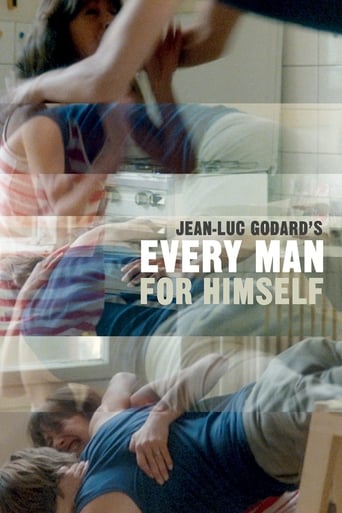framptonhollis
Godard's splendid return to more "mainstream" cinema is a powerful meditation on love and (mostly) sex. It is often disturbing and profound, as well as silly and darkly comic. Some of the humor seems juvenile, but it is hilarious nonetheless, and beyond the dirty jokes is a masterful avant garde film that is philosophical, sadistic, sexy, and deeply emotional.Godard has always been a highly ambitious filmmaker, and to this day his works proceed to increase in experimentation, and "Every Man for Himself" certainly displays his ability to have fun with film. Behind the unique synthesized soundtrack running throughout this film, various experimental visuals are utilized, particularly the effect of Godard randomly pausing on certain frames, creating a slow motion-esque look.Complex issues and characters populate this dense, yet brief masterwork of French cinema. The ending is one of simultaneous happiness and tragedy, as it the situation ends a slightly ambiguous, yet hugely fitting note as the main "lovers" walk away from the viewers, and the film.
zimmyfan66
Godard is fearless. Of that there is no doubt, and if that were enough to warrant him as a master of filmmaking, then countless filmmakers would be labeled masters for making films not for the audience but for themselves. Every director, to an extent, is making the film for themselves. But in the process of making it for themselves, they come into contact with and then disseminate elements that later speak to someone who might be watching the film. With the majority of Godard's films, it feels as though he is laughing at an in-joke or propagating an anti-societal agenda with elements only he is capable of deciphering. The result, at least for me, is almost always a drunken flurry of images, incongruous sounds, and inexplicable character actions that show me method in madness but distance me from feeling the madness in the method. "Every Man for Himself" is a perfect example of this. It jumps around and gets inside (as all Godard films do) a number of different characters, many of whom have nothing to do with anything other than perhaps preach a shocking aphorism here or there. The film starts with a woman, shows her in various countryside locations riding her bike and standing with wind in her hair. These are not actors but models, and NOT in the Bressonian sense. Bresson used his actors as models, true, but he still somehow was masterful at imbuing them with a sense of purpose (even if the purpose is dealing with purposelessness) and a sense of orientation. Godard fails at this, and perhaps because he WANTS to fail. It's clear watching any of his films that he is a man who cringes at the slightest hint that his art might be compared to another's or that an audience member dares "understand" his film. I understand this impulse, but not Godard's execution of it, with the exception of his work on everything before and including Pierrot le fou. In those films, Godard reached us with his passion for cinema (particularly American films) and his daring vision of contemporary life at odds with itself. It just seems, at a certain point, that Godard's filmmaking offers us little pieces of insight, little moments of cinematic ingenuity that do nothing to enhance the raw impact of his films but instead commend him as what he primarily is: a theorist and critic with more thought than execution going on in the majority of his post-60s films.
MisterWhiplash
Jean-Luc Godard's "comeback" movie is his best work since the 1960's, which is either saying a lot or a little depending on point of view of his work in the past thirty-five years. It actually tells *stories* while having the usual lot of bizarre play and dour commentary on commerce. The acting is also uniformly excellent, and they do a lot without always having to do too much; it's interesting to note Huppert here, the same year she got plopped into Heaven's Gate she got to play another woman 'of the night' as it were, but she fits much better under Godard's hand. It's the kind of movie that reminds me why I keep watching whatever the man does, even after I get burned by one of his more pedantic-semantic movies. It has energy, gusto, and I could put it on any time and feel like I got something new out of the experience.
Hammy-4
Somewhere about thirty minutes into the movie it struck me how much Godard loves something about movie-making. That's a rare feeling -- to watch a movie and feel the director's love, passion, or fascination for/with the medium. There's a character named Godard in the movie. He's a director. At one point, he says, "The only reason I make movies is because I haven't the strength to do nothing at all." One thinks that the Real Godard would have us believe the words were coming from him. BUT seeing his frames, his cuts, the way he sets the light -- the inventiveness of all of it -- you just feel his joy in the enterprise.




